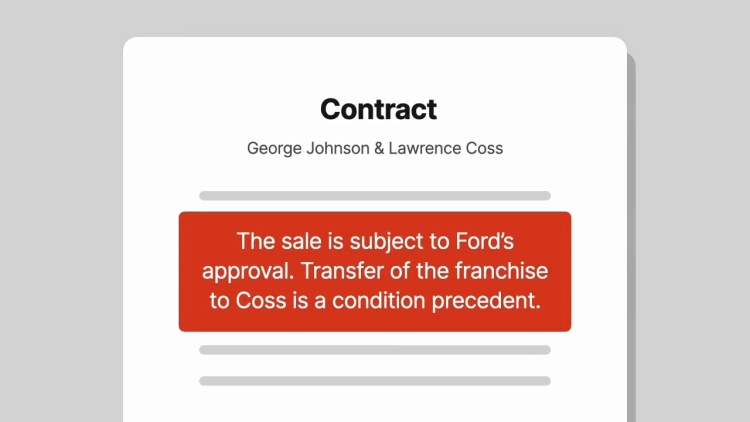Johnson v. Coss
Supreme Court of South Dakota
667 N.W.2d 701, 2003 SD 86 (2003)

- Written by Sara Rhee, JD
Facts
On January 7, 2000, George Johnson (plaintiff) entered into an Asset Purchase Agreement (Agreement) with Lawrence Coss (defendant), by which Johnson agreed to sell Coss his Ford Motor Company (Ford) auto dealership. The Agreement included an express condition, which provided that the Agreement would be nullified if Coss was unable to secure the consent and approval of Ford. Before granting consent and approval, Ford required Coss to find an on-site manager that Ford considered capable of operating a dealership. The manager was to own a substantial interest in the dealership. Coss found Mark Goodrich, who would serve as manager of the dealership with a 50 percent ownership interest. Coss and Goodrich were to jointly capitalize the dealership with $1 million. However, Ford advised Coss that it would not approve the plan unless there was a majority owner and the dealership was capitalized with $1.476 million. Coss revised the arrangement to give himself a 50.1 percent ownership of the dealership. Coss was ultimately unable to meet all the requirements set forth by Ford, and Coss’ attorney for the transaction averred that conversations between Ford and Coss made clear that Ford would not approve the sale of the dealership to Coss. Coss informed Johnson that because he could not secure Ford’s approval, the Agreement was null and void. Johnson brought suit against Coss for breach of contract and breach of the covenant of good faith and fair dealing. The circuit court found that Coss was responsible for preventing Ford from granting approval and granted Johnson summary judgment.
Rule of Law
Issue
Holding and Reasoning (Zinter, J.)
What to do next…
Here's why 911,000 law students have relied on our case briefs:
- Written by law professors and practitioners, not other law students. 47,100 briefs, keyed to 997 casebooks. Top-notch customer support.
- The right amount of information, includes the facts, issues, rule of law, holding and reasoning, and any concurrences and dissents.
- Access in your classes, works on your mobile and tablet. Massive library of related video lessons and high quality multiple-choice questions.
- Easy to use, uniform format for every case brief. Written in plain English, not in legalese. Our briefs summarize and simplify; they don’t just repeat the court’s language.





